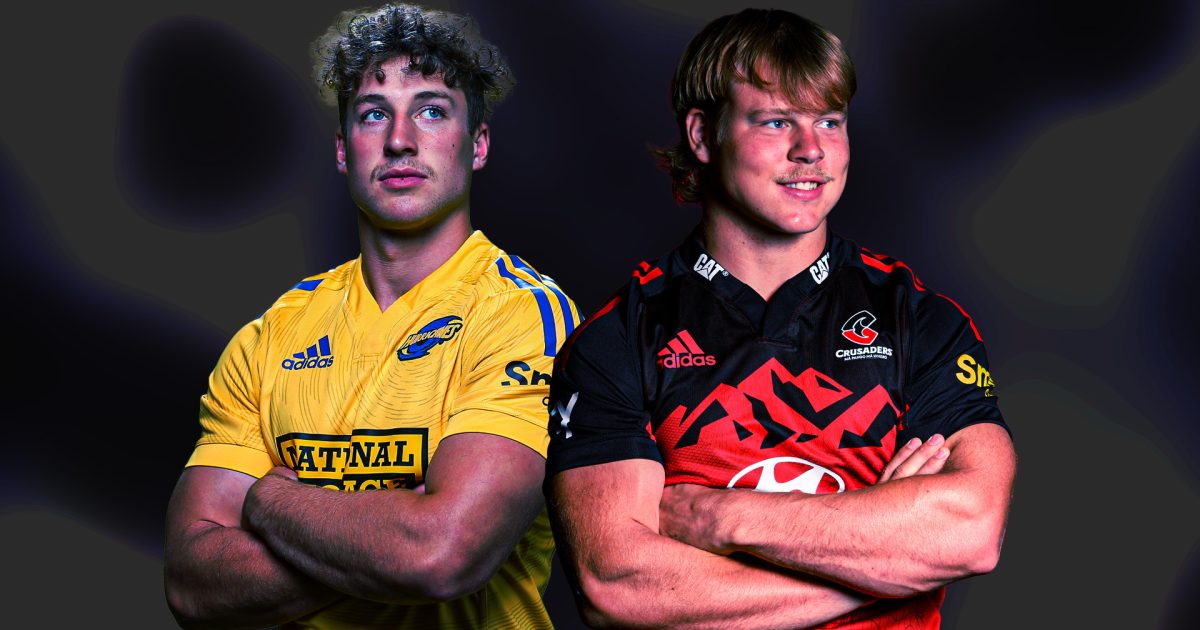Record number of Under 20s conversions nearing for New Zealand Super sides

New Zealand’s top age-grade stars are once again getting fast-tracked into Super Rugby this year, with George Bell and Riley Higgins the latest members of the 2021 side to earn spots in match-day squads for the first time.
Bell and Higgins have both yet to play provincial rugby but will likely make appearances off the bench for the Crusaders and Hurricanes this weekend.
Hooker Bell backed up Soake Vikena and played in all four of last year’s Under 20s matches, with the Baby Blacks taking on Wellington, Tasman, the Cook Islands and a Harlequins XV in lieu of an international match-ups due to Covid.
Higgins, a midfielder by trade, was given fewer opportunities and found himself sitting behind Corey Evans and Gideon Wrampling in the pecking order.
Less than a year on from the campaign, Vikena, Evans and Wrampling are all capped Super Rugby players while Bell and Higgins will join that group this weekend – but they’re not the only men from the 2021 age-grade side to suit up in this year’s Super Rugby Pacific competition.
Vikena and Wrampling, alongside utility backs Chay Fihaki, Jacob Ratumaitavuki-Kneepkens and Ruben Love, and All Black Josh Lord all made their Super Rugby debuts last season.
This year, the Blues have called upon the talents of Vikena, Ratumaitavuki-Kneepkens, Evans, loose forwards Anton Segner and Vaiolini Ekusai, and prop Josh Fusitua, while Moana Pasifika have utilised halfback Manu Paea.
While Wrampling has been sidelined through injury so far this season, he earned a first full-time contract with the Chiefs ahead of the season, alongside halfback Cortez Ratima. Lord has also been a key player for the side in 2022, making eight appearances to date.
In the capital, Love was joined by Manawatu loose forward TK Howden and Wellington pivot Aidan Morgan at the Hurricanes for 2022 with Higgins set to become the latest Under 20s star to earn a debut.
Further south, Fihaki, locks Zach Gallagher and Dominic Gardiner, and now Bell will be 2021 age-grade representatives to feature for the Crusaders, with Bell still eligible for this year’s Under 20s campaign.
Lock Fabian Holland (who is also eligible for this year’s team) and flanker Sean Withy, meanwhile, have both run out for the Highlanders this year.
All in all, 20 players from last year’s 35-man Baby Blacks contingent will have played Super Rugby by the end of the weekend.
It’s an impressive return from the 2021 cohort and while there’s still time this season for more players to make the step up to professional rugby, last season’s squad currently ranks behind the 2017 Under 20s side when it comes to converting age-grade players to Super Rugby.
By the time that the 2018 Super Rugby season had come to a close, 21 players from the prior year’s Baby Blacks squad had dipped their toes in the water with New Zealand’s five franchises.
At the Blues, Jacob Pierce, Dalton Papalii, Stephen Perofeta, Tamati Tua, Orbyn Leger and Caleb Clarke had all earned caps.
In Chiefs country, Luke Jacobson and Tiaan Falcon had played their debut matches while the Hurricanes had called upon Jordie Barrett, Asafo Aumua, Alex Fidow, Isaia Walker-Leawere and Kemara Hauiti-Parapara (although Hauiti-Parapara only made one appearance for the team, against the British and Irish Lions in 2017).
The Crusaders used Harrison Allan, Ereatara Enari, Braydon Ennor, Tima Fainga’anuku and Will Jordan while the Highlanders had employed the likes of Marino Mikaele-Tu’u, Thomas Umaga-Jensen and Josh McKay.
Papalii, Clarke, Jacobson, Barrett, Aumua, Ennor and Jordan have all gone on to represent the All Blacks.
Arguably, the number of recent Under 20s graduates utilised this year is more understandable than four year’s prior due to the impact of Covid, which has seen the vast majority of players miss at least a round or two of action throughout the season. The addition of Moana Pasifika also means New Zealand’s playing resources are stretched even thinner.
Bell’s Crusaders are set to take on the Western Force in Perth this Saturday while Higgins’ Hurricanes will host the Fijian Drua in Wellington a day later.











































































